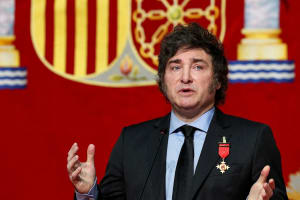Ecuador to open diplomatic office in Jerusalem, signaling closer ties with Israel

Ecuador is set to open its representative office this week in Jerusalem, the capital of Israel, President Daniel Noboa and Foreign Minister María Gabriela Sommerfeld Rosero announced on Sunday during a meeting with Israeli President Isaac Herzog.
The South American nation’s Jerusalem office will be located on the campus of the city’s prominent Hebrew University. While Ecuador’s embassy will remain in Tel Aviv, the Jerusalem office will hold official diplomatic status and serve as a center for research, innovation, and development.
The diplomatic move comes despite Ecuador’s decision to recognize the “State of Palestine” in 2015 and establish an embassy in the Palestinian Authority’s administrative capital Ramallah.
“We are very grateful… for declaring the opening of your representative office in Jerusalem, which will be a diplomatic representative office. It is a huge step forward,” the Israeli president stated, hinting that he hopes the new office will eventually be upgraded into a full-fledged embassy in the future.
“We are very happy to be here,” replied the Ecuadorian foreign minister Sommerfeld, who is of Jewish descent.
Noboa who recently won the Ecuadorian election, headed a delegation to the Jewish state to participate in the celebration of 75 years of diplomatic relations with Israel.
Ecuador’s current Jewish community is tiny and numbers only a few hundred people. However, Jews have lived in the South American country since the 1600s.
In the late 1930s, some German and Austrian Jews fled Nazi persecution and arrived in Ecuador, which was one of the few countries at the time that accepted Jewish refugees. In 1947, Ecuador supported the UN partition plan for British Palestine Mandate and established diplomatic ties with Israel in 1950.
The country initially established an embassy in Jerusalem but moved it to Tel Aviv in 1980, likely due to diplomatic and commercial pressures from the Arab and Muslim countries.
The Ecuadorian president emphasized that both countries face threats from terrorists who seek to undermine freedom.
“We, as a nation, have a war against terrorism and people who want to change our way of life,” Noboa stated.
The presidents of the two countries also reportedly discussed bilateral defense cooperation. Ecuador expressed interest in developing its economy, managing population growth, and ensuring food security. President Herzog suggested that Ecuador attract Israeli investors and companies. The two leaders also discussed cooperation in hydroelectric power and boosting two-way tourism.
Israel has traditionally maintained stable diplomatic relations with most South American nations. However, the war sparked by Hamas on Oct. 7, 2023, has strained its ties with some Latin American countries.
In November 2023, Bolivia’s leftist government said it was cutting ties with Israel due to the Gaza war.
“Bolivia decided to break diplomatic relations with the State of Israel in repudiation and condemnation of the aggressive and disproportionate Israeli military offensive taking place in the Gaza Strip,” announced Bolivian Deputy Foreign Minister Freddy Mamani, just a month after Hamas’ unprecedented massacre of 1,200 Israelis and the abduction of 251 others.
In May 2024, Colombian President Gustavo Petro announced that his country would sever diplomatic ties with Israel over the war in Gaza. Petro described Israel’s actions as “genocide,” a characterization widely criticized given Hamas’ use of civilian areas for military operations, which violates international law.
In October 2024, Nicaragua followed suit by cutting its ties with Israel while accusing the Jewish state of being an “enemy of humanity.”
By contrast, Argentina has strengthened its ties with Israel under the leadership of its pro-Israel president, Javier Milei. In July 2024, Argentina formally joined the growing list of nations that officially designate Hamas as a terrorist organization.

The All Israel News Staff is a team of journalists in Israel.
You might also like to read this:
















